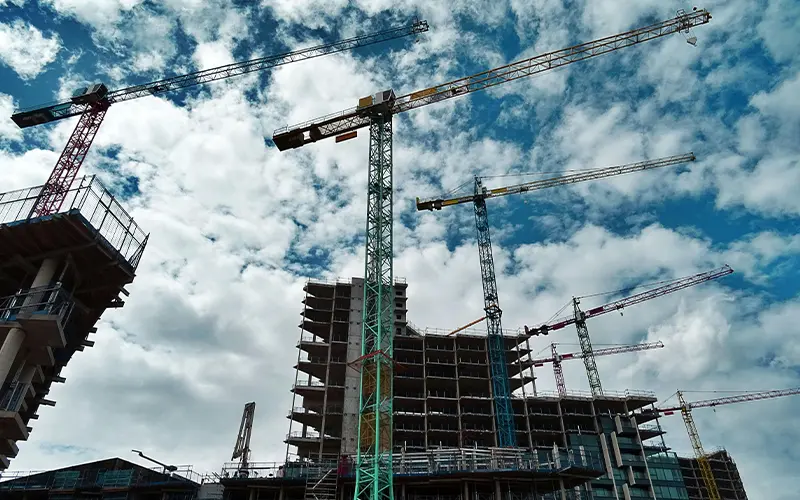The construction industry, renowned for its complexity and high-stakes projects, faces increasing pressure to improve efficiency, reduce costs, and enhance safety. With up to $1.6 trillion lost annually (via McKinsey & Company) due to construction delays, mismanagement of assets, and inefficiencies in materials handling, the need for advanced solutions is more urgent than ever.
In response to these growing demands, RFID technology plays a critical role in addressing these challenges, offering construction companies the ability to track materials, monitor equipment, and improve overall project management with real-time data. This article explores the transformative role of RFID in streamlining construction operations and ensuring that projects are delivered on time and within budget.
Issues in Construction
The construction industry faces a range of ongoing operational challenges that impact costs, safety, and project timelines, including:
- Equipment theft and loss across large, dynamic job sites
- Misplaced tools and assets, leading to downtime and replacement costs
- Inefficient inventory management, causing material shortages or overstock
- Worker safety risks, especially in restricted or hazardous areas
- Limited real-time visibility into project progress and asset usage
These issues often result in financial losses, delayed schedules, and increased safety concerns. Implementing RFID technology helps construction teams gain real-time visibility into tools, materials, and personnel—improving inventory control, enhancing safety measures, and enabling more efficient project management from start to finish.
Missing Equipment and Tools
An estimated $1 billion dollars is lost each year from construction sites. Less than 20 percent of construction site tools and equipment recovered.
(Source: Ener-tel.com)
Worker Safety
Private industry employers reported 2.8 million nonfatal workplace injuries and illnesses in 2022 – and 5,486 fatal work injuries in the US.
(Source: Bureau of Labor Statistics)
Project Tracking
US contractors lost between $30 billion and $40 billion in 2022 due to poor labor productivity. Better project management practices could reduce labor spending by 6% to 10%.
(Source: FMI Corp.)
RFID Technology
RFID technology utilizes electromagnetic fields to automatically identify and track tags attached to objects. These tags contain electronically stored information which can be read by an RFID reader from a distance. RFID systems are broadly classified into three categories:
Passive RFID tags do not have an internal power source and are activated by the electromagnetic energy transmitted from the RFID reader, making them cost-effective and suitable for various applications.
Active RFID tags, equipped with an internal battery, can transmit signals over greater distances and store more information, making them ideal for high-value asset tracking.
Semi-Passive RFID tags combine features of both passive and active RFID, using a battery to power the tag’s circuitry while communicating using the reader’s energy.
2026 RFID Integration Guide
A complete guide that will help retail brand owners, manufacturers, and distributors reap great benefits from integrating RFID into their supply chain.
Applications of RFID in the Construction Industry
From heavy equipment to material logistics, RFID brings real-time visibility and automation to every corner of the construction site. Here’s how the technology is making an impact:
Asset Tracking and Management
Construction sites are bustling hubs with numerous pieces of equipment and tools. Keeping track of these assets manually can be daunting and inefficient. RFID technology simplifies this process by allowing real-time tracking of equipment and tools.
- Equipment Monitoring: RFID tags affixed to equipment enable managers to monitor their location, usage, and maintenance schedules. This prevents equipment loss and ensures timely maintenance, thereby extending the lifespan of machinery and reducing downtime.
- Tool Management: Tools can be tagged to monitor their usage and location, minimizing the risk of loss or theft. This also ensures that the right tools are available when needed, enhancing operational efficiency.
Material Tracking
Efficient management of construction materials is crucial for timely project completion. RFID technology streamlines material tracking from suppliers to storage and the construction site.
- Inventory Management: RFID tags on materials allow for real-time monitoring of their movement, ensuring that materials are available when needed and reducing delays. This leads to better inventory control and reduced wastage.
- Quality Control: RFID can track the specifications of materials, ensuring that the correct materials are used in the construction process. This helps maintain high-quality standards and compliance with project specifications.
Safety and Compliance
Construction sites are inherently hazardous environments. Ensuring the safety of workers and compliance with safety regulations is paramount. RFID technology significantly enhances safety measures on construction sites.
- Worker Safety: Workers can wear RFID-enabled badges that track their location on the site. This allows for monitoring of hazardous areas and real-time alerts if a worker enters a dangerous zone. In case of emergencies, it aids in quickly locating and rescuing workers.
- Access Control: RFID badges can control access to specific areas on the construction site, ensuring that only authorized personnel enter restricted zones. This enhances security and prevents unauthorized access to sensitive areas.
Project Management
Effective project management is key to the successful completion of construction projects. RFID technology provides real-time data that aids in better planning and execution.
- Progress Monitoring: RFID tags can track the movement and installation of construction components, providing real-time data on project progress. This enables managers to identify bottlenecks and take corrective actions promptly.
- Site Logistics: Efficiently managing the flow of materials, equipment, and workers on the construction site is crucial. RFID technology optimizes site logistics, reducing bottlenecks and improving productivity.
Waste Management
Managing construction waste is essential for maintaining a clean and environmentally friendly site. RFID technology helps in tracking and managing waste materials.
- Tracking Waste: Crews can monitor waste materials by tagging them with RFID, ensuring proper disposal and recycling. This contributes to sustainability efforts and compliance with environmental regulations.

Benefits of RFID in Construction
The adoption of RFID technology in the construction industry brings numerous benefits:
- Improved Efficiency: Real-time tracking and monitoring of assets, materials, and workers lead to more efficient operations and reduced delays.
- Cost Savings: By preventing loss and theft of tools and materials, and optimizing equipment usage, RFID helps in reducing overall costs.
- Enhanced Safety: Monitoring workers’ location and controlling access to hazardous areas improves safety on the construction site.
- Better Project Management: Real-time data on the progress and logistics of the project aids in better planning and execution.
- Quality Assurance: Ensuring the right materials are used and tracking their specifications helps in maintaining high construction quality.
The Future of RFID in Construction
The future of RFID technology in the construction industry is promising. As the technology advances, RFID systems are becoming more affordable and easier to implement. Innovations such as the integration of RFID with other technologies including:
- IoT Integration: Combining RFID with IoT enables real-time data sharing and remote monitoring of construction sites, enhancing decision-making and operational efficiency.
- BIM Integration: Integrating RFID with BIM allows for more accurate tracking of materials and components, improving project planning and execution.
- AI and Machine Learning: Leveraging AI and machine learning algorithms with RFID data can provide predictive analytics, helping to foresee potential issues and optimize resource allocation.
Conclusion
RFID technology is revolutionizing the construction industry by enhancing efficiency, safety, and project management. Despite the challenges associated with its implementation, the long-term benefits make it a valuable investment for construction companies.
As technology continues to advance, the potential of RFID in construction will only grow, paving the way for smarter, safer, and more efficient construction practices. Embracing RFID technology today will position construction companies at the forefront of innovation, ready to meet the demands of the future.
Get Started Using RFID in Construction
The construction industry can significantly benefit from CYBRA’s Edgefinity IoT for RFID tracking solutions. By leveraging Edgefinity IoT, construction companies can enhance asset management, streamline inventory control, improve worker safety, and achieve better project oversight.
This advanced RFID solution offers real-time tracking and monitoring, ensuring that tools, materials, and personnel are efficiently managed and securely monitored. With Edgefinity IoT, the construction industry can overcome many of its traditional challenges, leading to increased productivity, reduced costs, and safer work environments.
Interested in RFID?
An RFID tracking system can help organizations of all sizes improve their supply chain efficiency. Contact the CYBRA team to schedule a demo today.
















